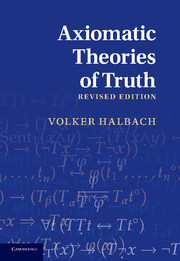Book contents
- Frontmatter
- Contents
- Preface
- Part I Foundations
- 1 Definitional and axiomatic theories of truth
- 2 Objects of truth
- 3 Tarski
- 4 Truth and set theory
- 5 Technical preliminaries
- 6 Comparing axiomatic theories of truth
- Part II Typed truth
- Part III Type-free truth
- Part IV Ways to the truth
- Index of systems
- Bibliography
- Index
1 - Definitional and axiomatic theories of truth
from Part I - Foundations
Published online by Cambridge University Press: 05 February 2015
- Frontmatter
- Contents
- Preface
- Part I Foundations
- 1 Definitional and axiomatic theories of truth
- 2 Objects of truth
- 3 Tarski
- 4 Truth and set theory
- 5 Technical preliminaries
- 6 Comparing axiomatic theories of truth
- Part II Typed truth
- Part III Type-free truth
- Part IV Ways to the truth
- Index of systems
- Bibliography
- Index
Summary
Philosophers have been very optimistic about the prospects of defining truth. The explicit definability of truth is presupposed in many accounts of truth: only whether truth is to be defined in terms of correspondence, utility, coherence, consensus, or still something else remains controversial, not whether truth is definable or not. The advocated definitions usually take the form of an explicit definition. Hence, if one of these proposed definitions is correct, truth can be fully eliminated as explicit definitions allow for a complete elimination of the defined notion (at least in extensional contexts). It is a quirk in the history of philosophy that many of these definitional theories, according to which truth is eliminable by an explicit definition, have come to be known as substantial theories as opposed to deflationary theories of truth, although most proponents of deflationist accounts of truth reject explicit definitions of truth and in most cases also the eliminability of truth.
A common complaint against traditional definitional theories of truth is that it is far from clear that the definiens is not more in need of clarification than the definiendum, that is, the notion of truth. In the case of the correspondence theory one will not only invoke a predicate for correspondence, but one will also use facts or states of affairs as relata to which the objects that are or can be true are supposed to correspond; in the case of states of affairs one will then also have to distinguish between states of affairs that obtain and those that do not.
- Type
- Chapter
- Information
- Axiomatic Theories of Truth , pp. 3 - 8Publisher: Cambridge University PressPrint publication year: 2014

